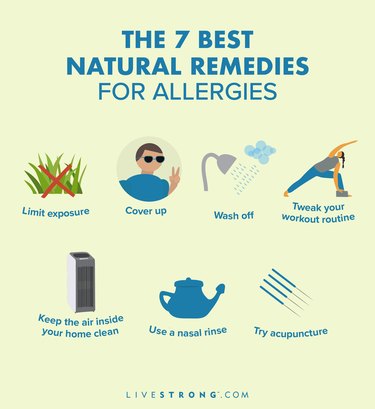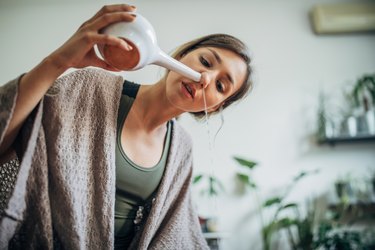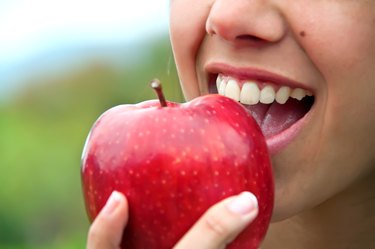
Tired of that foggy, drowsy feeling that sometimes comes from managing your seasonal allergy symptoms with over-the-counter meds? There are plenty of drug-free options that can help.
In fact, experts agree that antihistamines aren't necessarily the best allergy-fighter for everyday use.
Video of the Day
Video of the Day
"Medication doesn't work alone. You should save your antihistamines for the worst days, when you won't have as much control over your behavior," allergist Amina Abdeldaim, MD, MPH, owner of Willow Allergy in New York and Medical Director of Picnic, tells LIVESTRONG.com.
So what can you turn to instead to find relief from the sneezing, itching and sniffling? Here are some of the best ways to get rid of allergies, plus a few surprising remedies you're better off skipping.

1. Limit Your Exposure

It's tough to 100 percent avoid allergens like grass, pollen or dust in the spring or fall. But steering clear as much as possible is the number-one way to keep your symptoms from flaring up.
Still, sometimes allergy control means staying in your home.
"If you don't limit your exposure to the allergen, you're just exposing yourself to the problem. Any medicines or remedies you use are just band-aiding," Dr. Abdeldaim says.
Try to plan outdoor activities for times of day when pollen counts are at their lowest. In spring and summer (tree and grass pollen season), levels are usually highest in the evening, while mornings see the highest levels of ragweed pollen in the late summer and early fall, per the American College of Allergy, Asthma & Immunology (ACAAI).
You can also try downloading an app, such as My Pollen Forecast (free), to help you track pollen counts in your area along with your allergy symptoms.
2. Cover Up
When you do venture out, try to stop allergens from making their way into your system. Wear sunglasses to keep pollen from getting into your eyes, and wear a hat to keep as much of the stuff as possible from sticking to your hair, where it can cause irritation until you wash it out.
And that mask you've been wearing to protect against COVID-19? Keep it on. Face coverings — especially N95 filter masks — can block a large portion of allergen particles from getting into your airways, according to the ACAAI.
3. Wash Off

Pollen loves to cling to hair and clothing. "It's very sticky," Dr. Abdeldaim says.
Put on a fresh, clean outfit as soon as you come in from outside to avoid walking around in an allergen cloud, recommends the Mayo Clinic.
And take a shower as soon as you can, which will rinse lingering allergens out of your hair and off your skin.
Related Reading
4. Tweak Your Workout Routine
Pushing though a HIIT routine or a kickboxing class may kick your allergy symptoms into high gear. Why?
"Cardio and high-impact movements can temporarily increase inflammation and blood flow, which can exacerbate your allergies," Purvi Parikh, MD, an adult and pediatric allergist and immunologist with the Allergy & Asthma Network, tells LIVESTRONG.com.
A good rule of thumb? When your allergies are running rampant, stick to a low-key workout. Low-impact exercises like swimming, cycling or yoga may be your best bet.
5. Keep the Air Inside Your Home Clean
Do your allergies get worse at home? Even though the spring air might be refreshing, keeping your doors and windows closed means fewer irritating allergens can make their way inside.
Filters and air purifiers can help too. Use a high-efficiency filter for forced heating or air-conditioning systems, run a HEPA filter in your bedroom and clean your floors often with a HEPA-equipped vacuum, per the Mayo Clinic.
6. Use a Nasal Rinse

While it won't get rid of your allergies altogether, a quick saline-solution rinse can flush mucus and irritants out of your nose and reduce congestion, which helps relieve allergies fast.
You can make a nasal rinse at home by combining 1 cup of lukewarm distilled or boiled water, 3 teaspoons iodide-free salt and 1 teaspoon baking soda in an airtight container, per the ACAAI.
Use a nasal bulb or neti pot to pour the solution into one nostril, turning your head so the solution flows into your other nostril (instead of down your throat). Afterwards, blow your nose to dislodge any lingering mucus.
Try These Nasal Irrigation Devices
Warning
Saline rinses and neti pots should be used with caution. They can give you a nasal infection if you don’t use them properly. The water used for your saline rinse should always be distilled or boiled for 3 to 5 minutes, according to the FDA. Never use tap water without boiling it first, because it could contain infection-causing bacteria.
7. Try Acupuncture
Acupuncture seems to be effective for some people as a means of natural allergy relief.
A January 2015 meta-analysis of 13 studies in the American Journal of Rhinology & Allergy concluded that acupuncture can significantly ease congestion and reduce medication use while improving quality of life in adults with seasonal allergies.
It isn't a cure-all, but it might be a useful tool in your allergy-fighting arsenal.
"I recommend it for people with mild allergies who want to minimize their medication use," Dr. Abdeldaim says.
Tip
Acupuncture is generally considered safe, provided it’s performed by a trained expert using sterile needles, according to the Mayo Clinic. Seek out a certified practitioner, and get the green light from your primary care doctor before undergoing any treatments.
What About Probiotics?

Some research suggests that the friendly bacteria might play a role in managing seasonal allergies, but don't count on yogurt or a probiotic supplement to soothe your symptoms: Experts don't yet know which types of bacteria might be the most effective for fighting allergies, concluded a 2018 review in Clinical and Molecular Allergy.
"Nobody knows the correct dose or strain," Dr. Abdeldaim says.
On the other hand, there's no real downside to adding probiotics to your diet if you really want to try, she points out.
What About Local Honey?
Claims abound that locally produced honey exposes the immune system to local pollen, which could have a desensitizing effect that works sort of like allergy shots. But the solution isn't as sweet as it sounds.
In truth, honey doesn't actually contain enough pollen to help with seasonal allergies — and there's no scientific evidence that eating the stuff will improve your symptoms, per the American College of Allergy, Asthma & Immunology.
What About Butterbur?
Unfortunately, this is another commonly touted natural remedy for allergies that doesn't quite measure up from a scientific standpoint.
While a handful of studies have shown that butterbur supplements could help ease symptoms about as well as standard antihistamines, the studies were small and are now relatively outdated.
Experts also don't know for sure if long-term use of butterbur is safe, per the National Center for Complementary and Integrative Health.
In short, this is one remedy to steer clear of until we have more high-quality research.
What About Quercetin?

Quercetin is a polyphenol compound that occurs naturally in foods like onions, apples, berries and tea. It's often touted as a natural antihistamine because it's been shown to exhibit anti-inflammatory and immunomodulating properties in test tube and animal studies, according to a 2020 review in Allergy, Asthma & Clinical Immunology.
But not nearly enough is known to say whether it might do the same in humans.
"I can think of little downside to eating more quercetin-rich foods, but I can't recommend it as a way to manage allergy symptoms," Dr. Abdeldaim says. (Just keep in mind that certain raw fruits and veggies can potentially make your symptoms worse.)
What About Garlic?
Have you heard that garlic can cure your allergies? There are plenty of herbal remedies that people swear by, and garlic is often dubbed the best herb for allergies.
Garlic boasts a lot of health benefits, one being that it contains quercetin, a flavonol that has been found to help reduce inflammation and have antihistamine effects, per July 2016 research in Pharmacognosy Review.
It's likely quercetin that has lead some people to use garlic as a natural allergy remedy, but there's not enough research to support its use.
What About Zinc?
Wondering if zinc can help with allergies?
Allergies are an abnormal immune response, and zinc supports normal immune function, per the National Institutes of Health — so on paper, it makes sense that zinc would be a good home remedy for allergies.
But while some studies have linked low levels of zinc to a higher risk for allergies and asthma, there is no conclusive research that shows a direct cause and effect. In other words, we don't know for sure that low levels of zinc cause allergies, and we also don't know if getting more zinc might help with allergy symptoms.
However, because zinc is an essential nutrient that supports a healthy immune system, it's not a bad idea to include foods high in zinc in your diet for overall health.
Related Reading
Safety Tips to Keep in Mind
Natural allergy relief can sometimes be a process of trial and error.
"I would say that a tool kit is necessary. You can't just rely on one thing," Dr. Abdeldaim says.
As you explore different options, keep these smart safety tips in mind:
1. Natural Isn’t Always Better (or Effective)
Countless herbal remedies and supplements are touted as seasonal allergy fighters. But most aren't backed by good scientific research.
At best, remedies that haven't been studied might simply be a waste of money. But at worst, they could interact with other medications you might be taking or pose the risk for harmful side effects.
In short? Just because a remedy is natural doesn't mean it's useful or safe, per the NCCIH. Always check with your doctor before trying a new herb or supplement for your seasonal allergy symptoms.
2. Don't Use Natural Remedies for Severe Reactions
You should never turn to home remedies to treat severe allergic reactions or anaphylaxis, which can be life-threatening. Signs of this type of reaction include, per the Mayo Clinic:
- Wheezing or trouble breathing
- Nausea, diarrhea or vomiting
- Feeling dizzy or fainting
- Flushed or pale skin, hives, itching or other such skin reactions
- Weak, rapid pulse
- Low blood pressure
- American Academy of Allergy Asthma & Immunology: "Saline sinus rinse recipe"
- American College of Allergy, Asthma & Immunology: "Seasonal allergies"
- American College of Allergy, Asthma & Immunology: "Will honey relieve my seasonal allergies?"
- Clinical and Molecular Allergy: "House dust mite-related respiratory allergies and probiotics: A narrative review"
- American Journal of Rhinology & Allergy: "Acupuncture for the treatment of allergic rhinitis: a systematic review and meta-analysis"
- U.S. Food & Drug Administration: "Is rinsing your sinuses with neti pots safe?"
- Allergy, Asthma & Clinical Immunology: "Quercetin with the potential effect on allergic diseases"
- Mayo Clinic: "Acupuncture"
- Mayo Clinic: "Seasonal allergies: Nip them in the bud"
- National Center for Complementary and Integrative Health: "Natural doesn’t necessarily mean safer, or better"
- National Center for Complementary and Integrative Health: "Seasonal allergies at a glance"
- The BMJ: "Randomised controlled trial of butterbur and cetirizine for treating seasonal allergic rhinitis"
- National Institutes of Health: "Zinc"
- Pharmacognosy Review: "Overviews of Biological Importance of Quercetin: A Bioactive Flavonoid"
- Mayo Clinic: "Anaphylaxis"
Is this an emergency? If you are experiencing serious medical symptoms, please see the National Library of Medicine’s list of signs you need emergency medical attention or call 911.